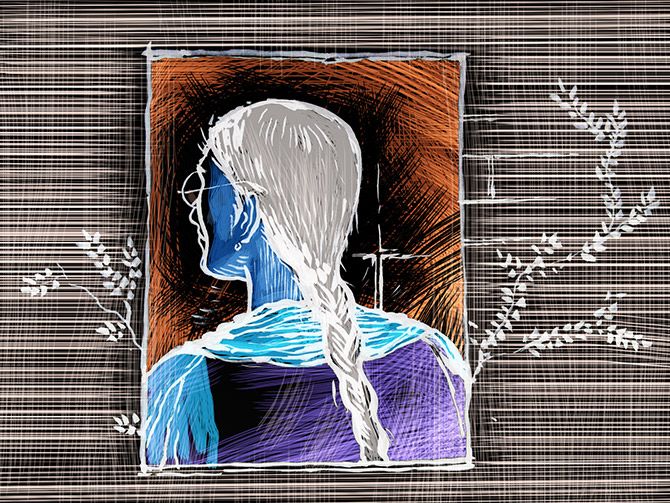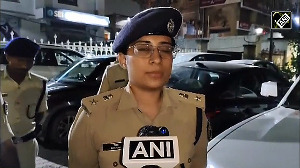'I can tell you, Mr Chairman, from personal experience that there is nothing sadder than witnessing a close one, a loved one with mental illness at close quarters.'
'I have lived with a victim of mental illness. Like many in that condition, very often such people are in a state of denial.'
'The National Crime Records Bureau has calculated in 2014 that at least 15 suicides take place in India every hour.'
'That is too many.'
'These 15 instances in every 60 minutes is our collective failure to recognise and solve the problem.'
'The police should be trained to understand that an attempted suicide is a cry for help.'
'It is not a crime. Who is going to tell this to the police, Mr Minister?'
Dr Shashi Tharoor, in a memorable speech in the Lok Sabha on March 24, touchingly spoke up for the nation's mentally ill.
Illustration: Dominic Xavier/Rediff.com

When Parliament passed the new Mental Healthcare Bill on Monday, PTI reported that Health Minister J P Nadda thanked Congress MP Shashi Tharoor for his "valuable" suggestions made during a discussion on the legislation in the Lok Sabha.
'Thank you for valuable suggestions @ShashiTharoor Ji. As I said in Parliament, budget will never be a issue.#MentalHealthcareBill,' Nadda tweeted.
The bill, which seeks to decriminalise suicide attempts by the mentally ill, and provide for the right to better healthcare for people suffering from mental illness, was passed in the Lok Sabha on Monday.
Here is Dr Tharoor's entire speech -- please note it is an uncorrected version, which we publish in the public interest -- that every Indian must read.
Honourable Deputy Speaker Sir,
I thank you for allowing me to speak on the topic which, frankly, has not been easy for us as a society to deal with.
I must say that mental illness has been an issue which, by and large, we in India have preferred to brush under the carpet in the hope that it will go away. Or it is really not something we have to deal with.
But the fact is that we do need to acknowledge, to understand and to take measures to do something about it. The big elephant in the room is the fact that every one of us actually knows somebody who has a mental health problem.
We do not realise it; we may not like it; we may not be aware of it; they may not be aware of it; or they may not be conscious of it, but I can assure you that not one of us in this room has failed to come across it...
Sir, you are right that the problems are there. But we have not been giving this issue the importance that it deserves.
That is why I think this debate is an important one. As our honourable minister said, we owe it to ourselves, to our loved ones, and to the future of our society, to find solutions in grappling with it.
We must stop looking the other way.
As I said, we have really ignored the problem. Very often, when we have considered mental health, we have done so with ignorance and prejudice.
Let us just look, for example, at the past legislations on this subject. We have, for instance, the Lunatics Removal Act of 1851, the first legal provision on this subject; the Indian Lunatic Asylum Act of 1858; the Military Lunatics Act of 1877 -- perhaps we may think that they have all gone to the other side of the border, but still military lunatics had an Act here -- and the Indian Lunacy Act of 1912.
These were all bequeathed to us by the colonial authorities. I think many of you know what I think of many of the legal and penal provisions left behind by the colonial authorities.
But the fact is that their only answer to mental health problems was to brand individuals as lunatics, confine them in so-called mad houses, physically in certain spaces and pretend that that took care of the problem.
Even just before Independence in 1946 there was a Bhure Committee, a government committee of inquiry which concluded, and I quote: 'The majority of mental hospitals in India are designed for detention and safe custody without regard for curative treatment.'
But I am sorry to say that this has continued largely to be the pattern even after Independence.
It was easy for a foreign power dominating a (people) to incarcerate individuals and continue with the business of ruling as they saw fit. But in independent India our government is there to serve Indians.
We must look after the health and well being of our own people.
We owe it to our people to find answers, not to just brand them as lunatics and look the other way, instead of giving assistance.
It has to be admitted that we are already late in rising to the occasion.
The 1987 Act, which we are now here to amend, was first drafted actually in 1950. It took decades of protracted debate even to get adopted 37 years later.
By the time that Act was realised, it was already out of date.
It is no wonder that Human Rights Watch, for example, has reported that inmates particularly women and children in our mental health facilities are treated worse than animals.
Not only have our laws been stuck in this colonial era mindset, but our own mindsets with regard to mental health have also been frozen in time and frozen in history.
As India looks to a new future in the 21st century, it must acknowledge the errors that we have made in the past.
We must right long-standing wrongs, even if we have to accept hard truths and reorient our thinking.
It was only in 2007 that India ratified the United Nations Convention on the Rights of Persons with Disabilities, following which the UPA government commenced the process of overhauling the antiquated Mental Health Act of 1987.
Even the basics have had to be re-visited for the better.
I note from Shri Nadda's Bill that the term 'mentally ill' has been replaced with 'person with mental illness,' which preserves the dignity of the individual seeking treatment.
I am really grateful that Shri Nadda has continued this kind of line of logic and approach and continued the good work.
On this, I want to assure you and the government that my party and I are with him.
We agree that there is no justification for India to continue to rely on outdated, and patently unjust notions, of so-called treatment, which really is locking people up.
The world has moved ahead. Other countries have discovered better answers.
The truth is, that if we can focus on helping those affected directly, helping their families, helping them within their communities, then people afflicted with mental illness can re-build their lives and move forward.
It is for us as a society -- if we want to be a modern, progressive society -- we must do this, Mr Chairman.
Mental health remains an issue that is not only difficult for many to comprehend, but it comes as a colossal baggage of stigma.
This whole attitude that comes in -- the way in which people are disregarded, despised, one is shunned as a mad person, a lunatic and worse if it is known that one has even been to a psychiatrist -- one is looked upon by many people with fear or with confusion.
'What is the matter with this person? He goes and sees a psychiatrist.' That is the attitude in our culture.
The patient is painted with a brush of ignorance and treated very often by distance.
'This person is not well mentally, let us keep distance from him.'
The real truth is this person needs medical assistance, needs help and understanding.
It is an illness. It is not just a behaviour pattern.
The truth is, of course, that mental illness is a very complicated disability to (gauge).
When you have another kind of disability, somebody is sitting with a broken leg you can see he has a broken leg.
(If) somebody has a broken mind, it is extremely difficult to diagnose it.
Sometimes, people, as far as their appearances go, seem perfectly healthy.
They are happy. They come across as social beings while confronting painful inner battles.
I can tell you, Mr Chairman, from personal experience that there is nothing sadder than witnessing a close one, a loved one with mental illness at close quarters.
I have lived with a victim of mental illness. Like many in that condition, very often such people are in a state of denial.
They do not accept that they have a mental problem. They do not even go to see a doctor.
Nadda Sahib is talking about how they can easily authorise somebody to help them, but they do not accept that they are mentally ill.
One of the first symptoms of mental illness is an inability to recognise it and to be in denial about it.
They are, therefore, unwilling to seek help even after their behaviour may raise questions about their mental condition.
Very often you can see in public behaviour that somebody is really not normal, or right, and when you say 'Will you go and see a doctor as this is not a right behaviour?' they will say, 'Nothing wrong with me.'
The truth is, it gets ten times worse with its private behaviour. Even diagnose is a challenge.
There are many, many people, perhaps even in our own profession, suffering from undiagnosed mental illness.
I must say that we need more people to set (the) example of a prominent film actress. I cannot take her name in the House, but she has courageously spoken out about her battle with depression and how difficult it was for her to receive understanding, let alone help for her condition.
And by doing so she has brought some people out to seek help. But this is again a part of the challenge.
I would urge the minister to think in terms of how to use role models to go and say, 'I have had this problem, it can be treated. There is nothing wrong.'
She is a big star in Bollywood. Therefore, her message gets across to the general public.
There are patterns, of course, that experts can notice, but where even seeking an expert assistance is sometimes treated with stigma, many are reluctant to seek help.
The stigma and the lack of a support system mean that most of them must fight these battles on their own.
A frustrating and isolating experience sometimes lead to such eventualities, that is, suicide, which the honourable minister has mentioned.
Sir, the National Crime Records Bureau has calculated in 2014 that at least 15 suicides take place in India every hour.
That is too many.
And the fact is: These 15 instances in every 60 minutes is our collective failure to recognise and solve the problem. This is what confronts us.
This bill brings to the table an opportunity for us as a society to do better about it.
The police should be trained to understand that an attempted suicide is a cry for help. It is not a crime.
Who is going to tell this to the police, Mr Minister?
I hope you will raise this in the Cabinet.
It is not only just here today in this law, it is other ministries also that have to be conscious.
In fact, if we treat attempted suicides as a crime to be punished, the police way is going to prevail over the human way, that your Bill is actually talking about.
What we need to ensure is that people get help.
They get guidance and assurance that they would get the helping hand that they are seeking from all of us.
Then, they would find their way back to happy and productive life.
We owe it to them to extend that hand to bring them back to a meaningful life and a life full of meaning quite literally.
I am sorry to say that our educational system is so much at fault in this particular problem.
I am afraid the very institutions that we have created, to give our children a future, are also putting them under so much of pressure that their future is disappearing.
Sir, there was a recent study, which I have here, to ascertain the presence of psychological mobility amongst medical undergraduates in India.
Just people who are going to be doctors and who are studying medicine, half of (our) medical students suffer from depression, anxiety and stress as per a global study.
This is 50 per cent. This is not a small matter.
We have both Dr Harsh Vardhan (the minister of science and technology and earth sciences) and Dr Mahesh Sharma (the minister of tourism)sitting there. They are eminent doctors.
This is the process which is producing our doctors. They need trained professionals and I hope that the bill will deliver trained professionals.
I am concerned, very seriously, by the gap in our professional capacities at the moment.
The psychiatrists are telling us that in a society where psychiatrists amount to 0.2 for every one lakh people, there is one psychiatrist in our country for (every) five lakh people.
Not to speak of shortage of nurses, psychologists, psychotherapists and even NGOs working in the mental health space are few and far between.
How can we rise to this challenge?
We have to put this issue higher on the agenda. We are discussing it on a Friday afternoon (March 24) in a half empty House.
The truth is that this is an issue that is a national challenge.
I certainly hope that you will also contribute, Mr Minister, to building networks to seriously rehabilitate mentally ill patients and persons who require constant assistance even after their treatment.
Now there are a number of good things in this bill. But they leave also a number of significant issues out.
Even when you talk about mental health professionals, clinical psychologists and even those trained in homoeopathy, naturopathy, ayurveda and Unani have been recognised in your Bill, but psychoanalysts, psychotherapists counselling psychologists and others have not been included in the bill, amongst the professionals who can help us and our people on mental health issues.
I would request the minister -- when the bill is adopted -- to bring in a small amendment and just add these categories.
When you have mentioned so many, you have failed to mention psychoanalyst, psychotherapist and counselling psychologist, it is a genuine omission and rather a serious omission.
As you know, Mr Minister, there would be no technical difficulty in just amending the bill at the moment of adoption with one small change, especially since we are going to continue this process on Monday (March 27), I understand.
All around the world, these are the people who are assisting mental health victims and in various contexts, in the family, in the schools and hospitals and so on.
The whole principle is that we should not only address mental health problems after they have emerged, and have been diagnosed, but we should prevent individuals from going into depression in the first place.
If you have counsellors in the school system and if you have them in the medical colleges, you may be saving suicides, you may be benefiting India with future geniuses, future good doctors and so on because you have prevented them from committing suicides.
We have to help our children.
We have to help our adolescents and we have to help all our citizens who are at risk.
Therefore, we need a wide range of professionals with a wide range of skills.
Mr Minister, I think we need to ensure that we create an infrastructure where mental health issues, even as they arise at the earliest of stages, can be addressed and resolved without having to wait for treatment at a later more complicated stage.
I will give you one example, from my home state of Kerala.
I have been informed there, by the Indian Association of Clinical Psychologists, that every individual, who seeks mental health services, whether it is a child, who (has) learning (disabilities), or somebody with serious psychiatric complications, is expected to meet with a psychiatrist.
As I said, there are very (few) psychiatrists available. But you have to meet a psychiatrist, that too, only medical science professionals, those qualified with a medical degree, are deemed suitable.
Those who studied behavioural sciences are treated as subordinate or inferior, whereas what we clearly need is a multi-disciplinary, multi-pronged approach, that takes advantage of all that is offered, in different streams, levels, layers and branches of mental health discourse and practice, so that more holistic answers and solutions can be found.
We want to address the issue. And not to create another hierarchy of professionals, when we are dealing with this issue. We are already having a very hierarchical society.
Let us not reduce mental health again (to) being stuck in hierarchy of professional treatment.
Sir, the bill is very broad in its defining terms and definitions. Even individuals with, what could be deemed to be relatively minor ailmentsb such as memory orientation, or mood disorders are brought within its purview. Now, I think, that is good.
But if we are doing that, then we must also be able to provide a wide range of assistance at all levels; bring onboard professionals with different kinds skills and focus areas.
In our society it is not just a question of people in the drawing rooms, or offices, that we all frequent.
There are displaced persons, whose lives have been devastated by natural calamities, by riots, the people who have lost their homes, the Kashmiri Pandits...
Now, Mr Minister, you have struck a good balance in the bill, between involuntary treatment and the rights of the patient.
But the fact is, that when you are talking, just as you did in your introductory remarks, about them nominating a person to decide on their behalf, that is a bit worrying.
Because, the fact is, who decides whether one is at risk of harming oneself or the other?
Who decides that you are well enough to nominate somebody else, or, when you are not well enough, that you need to nominate someone else?
In practice, we are talking about the condition that many people are in denial about.
If the people who are in denial, and are then expected to nominate somebody else, they would not do it, because they (feel they) are not ill in the first place.
Then if the nomination is coaxed, under duress, or if a signature is false, or anything else, you are suddenly subjecting a person to involuntary treatment.
I think, this is not going to be easy.
I hope that you will be careful in drafting the regulations of the bill, to ensure that it is not misused, because if we decide to disallow involuntary treatment, then we will be leaving out mental patients who have lost their capacity to judge their own mental state.
But if we give people unsolicited powers, to impose involuntary treatment, to lock up people, incarcerate people, without adequate medical evidence, then we are actually opening the door to abuse and misuse.
So, by instituting review procedures for hospitalisation, and leaving room for medical institutions and family members to take action, on behalf of a patient, I think, we should really strike a balance, Mr Minister.
Not just in the bill, but in the regulations, under which you will implement the bill. You should strike the right balance, the balance that we have lacked so far.
And I do want to applaud you for the steps you have taken in this bill, in that direction.
I am glad that the drafting of this bill was inclusive as (the) minister has mentioned. A wide range of people have offered comments, suggestions, and expertise, which include civil society and medical professionals.
Indeed, we should, today, appreciate the efforts of the previous government and Shri Ghulam Nabi Azad, who offered a well-rounded bill and, of course, Shri J P Nadda for keeping up the momentum and bringing it to us today.
The bill will inevitably require refinement, from time to time, because the world is moving on. The treatment of mental health illnesses is getting more sophisticated each year. We have to be prepared to keep amending our provisions.
But I do want to say that the issue of mental health, in our legislative process, needs to find an important place and, needs to accept the progress being made in today's bill, but also newer methods and solutions may be found.
Some may raise questions, like whether we are over-reaching, and whether our society is really prepared for a bill of this nature. It might well add to the stigma with which victims are seen.
Legislation laws sometimes have to take a leap and we have to move not only with the times but we have to move ahead of the times also.
Just earlier today, somebody was pointing out that the judiciary keeps moving ahead of us.
Let us, for once, not give our friendly judges the opportunity to say that we are behind times or something like this and some PIL may come up with new, farther reaching things.
Let us pass this bill soon and let us make sure that this landmark legislation you have offered us today, Mr Minister, is implemented quickly, with good regulations and is kept open for amendment as we need in the future.
I believe, future generations will be grateful to us for having laid down a much improved marker for treating mental health.
I have a couple of final points. I do want to make one more request to the honourable minister, not to amend the bill, but just requiring your action.
You need to review the existing case load of mental patients, admitted in our institutions, because all those who are admitted now are being admitted under the old law.
And that includes people who are involuntarily locked up and so on.
You should give us a date by when you can review these cases.
As an MP, a case has been brought to my attention of a 46-year-old woman who was forcibly institutionalised.
She was drugged unconscious by health workers, brought by her doctor, who said that they were giving her a vaccination.
Then she was taken; she was given forced medication and electric shock therapy.
Somehow her friends and relatives went to the courts and the courts ruled that she was not mentally ill and should be released.
Thank god, your bill does allow for the consent of the patient, as well as the approval from the concerned board before administering any electric shock therapy.
But this is what had happened to this lady.
So, if our existing laws and our existing societal biases, against certain segments of people, make it extremely easy to falsely institutionalise a person, then those who suffer under the previous law must not be left behind and forgotten when we pass today's law.
That is why, I request you to order an inspection and review of the existing caseload of those locked-up.
I do want to say something else, that is of concern to my party, which is, that in our country, sadly, whenever we do anything that is good for society, we are forced to bear in mind that the problems are particularly for the poor, for the lower caste, for the marginalised sections of the society, women, and homeless, and such people are the first victims of abuse.
I want to request you we must take monumental steps to reduce our social biases, restore the right of life with dignity that is fundamental to each person.
Just today we are talking about an MP misbehaving in an airline and certainly action must be taken. But I can tell you about an airline misbehaving with the mentally handicapped person.
A person suffering from cerebral palsy was forced to leave a flight. People with physical deformities are facing humiliations... (Interruptions)
We must change our attitudes.
We must change the attitudes of society.
All public servants must also have a constructive opportunity.
Let me conclude by welcoming this legislation.
I congratulate the minister for rising to the occasion.
Let us all, as a society, rise to ensure that our citizens do not fight these battles of the mind alone.
Let us tell them that we as a people are here to support, to help, to hold their hand, until once again they are able to stand strong, and lead a healthy, happy and self-determined life.
Thank you.











